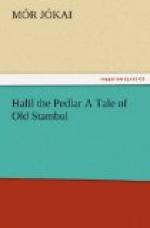“That will never happen,” said Halil, unbuckling his sword (for no weapon may enter the Seraglio) and handing it to Musli; “take care of it for me till I return, and if I do not return it will be something to remember me by.”
“Then thou art really resolved to go?” inquired Musli. “Well, in that case, I will go too.”
At these words the others also began to bestir themselves, and when they saw that Halil really was not joking, they accompanied him right up to the Seraglio. Into it indeed they did not go; but, anyhow, they surrounded the huge building which forms a whole quarter of the city by itself, and as soon as they saw Halil pass through the Seraglio gates they set up a terrific shout.
Alone, unarmed, and without an escort, the rebel leader passed through the strange, unfamiliar rooms, and at every door armed resplendent sentries made way before him, closing up again, with pikes crossed, before every door when he had passed through them.
On reaching the Hall of Audience, a couple of Kapu-Agasis seized him by the arm, and led him into the Cupola Chamber where Sultan Mahmud received those who came to render homage.
In all the rooms was that extraordinary pomp which is only to be seen on the day when a new Sultan has ascended the throne. The very ante-chamber, “The Mat-Room,” as it is called, because of the variegated straw-mats with which it is usually covered, was now spread over with costly Persian carpets. The floor of the Cupola Chamber looked like a flower-bed. Its rich pile carpets were splendidly embroidered with gold, silver, and silken flowers of a thousand hues, interspersed with wreaths of pearls. At the foot of a sofa placed on an elevated dais glistened a coverlet of pure pearls. On each side of this sofa stood a little round writing-table inlaid with gold. On one of these tables lay an open portfolio encrusted with precious stones and writing materials flashing with rubies and emeralds; on the other lay a copy of the Alkoran, bound in black velvet and studded with rose brilliants. Another copy of the Alkoran lay open on a smaller table, written in the Talik script in letters of gold, cinnabar, and ultramarine; and there were twelve other Korans on just as many other tables, with gold clasps and pearl-embroidered bindings. On both sides of the fire-place, on stands that were masterpieces of carving, were heaped up the gala mantles exhibited on such occasions; and side by side, along the wall, on raised alabaster pedestals were nine clocks embellished with figures, each more ingenious than the other, which moved and played music every time the hour struck. Four large Venetian mirrors multiplied the extravagant splendours of the stately room.
Around the room on divans sat the chief dignitaries of the Empire, the viziers, the secretaries, the presenters of petitions according to rank, in splendid robes, and with round, pyramidal or beehive-shaped turbans according to the nature of their office.




